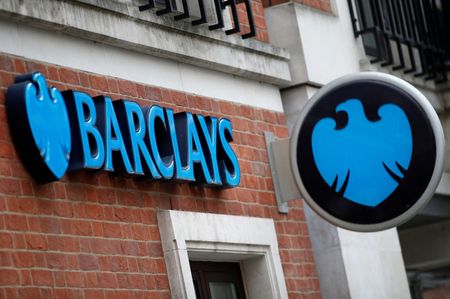By Lawrence White and Iain Withers
LONDON (Reuters) -Barclays beat forecasts with a small rise in third-quarter profit on Wednesday lifted by a record performance in fixed income trading, but costs and loan charges crept higher in a sign of ongoing challenges.
The British bank made a profit before tax of 2 billion pounds ($2.3 billion) in July-September, up from 1.9 billion a year ago and above analyst forecasts.
However, a hefty charge for potentially soured loans – topping up its provisions for the year to 722 million pounds – highlighted the tough outlook as a worsening cost of living crisis squeezes borrowers.
Barclays shares opened slightly higher, but were last down 1% at 0833 GMT in a broadly flat FTSE index, as investors took in the rise in credit losses and adjusted costs 4% higher than expected.
“The key negatives in the numbers are the adjusted cost miss and the incrementally more cautious tone on asset quality,” Credit Suisse analysts said.
A trading boom in volatile markets provided a bright spot, as revenue in the fixed income, currencies and commodities (FICC) business doubled to 1.6 billion pounds from a year earlier, the highest total for the third quarter on record.
That helped Barclays to grow profits, in contrast to Wall Street rivals which earlier this month reported more muted performances.
Barclays’ surge in FICC income compared favourably with U.S. peers such as Morgan Stanley, which saw revenues from similar business rise 33% in the same period, and JPMorgan which saw only a 22% gain.
European rival Deutsche Bank said fixed income trading revenues rose 38%.
Barclays’ powerhouse performance in FICC, typically the highest-earning business in its investment bank, more than compensated for a slump in dealmaking that has hit merger and advisory fees across the industry.
Barclays’ advisory fees including merger and acquisitions (M&A) fell 45% in the third quarter to 533 million pounds. Global M&A volumes have slumped to $2.96 trillion as of Sept. 28 this year, compared to $4.4 trillion in the same period last year.
Analysts said Barclays’ results were flattered somewhat by the slide in the value of the pound relative to the dollar, as the bank books substantial revenues from its U.S. investment bank and consumer business and converts these into sterling.
“There is a caution to today’s statement and little in the way of news in terms of returns for shareholders – perhaps in response to the recently mooted prospect of a windfall tax on banks,” said John Moore, senior investment manager at RBC Brewin Dolphin.
Banks are wary that UK Prime Minister Rishi Suank’s new government could be tempted to slap more taxes on the industry to help prop up the government’s finances.
COST OF LIVING CRUNCH
The bank’s results come amid the most turbulent period in Britain’s politics and economy since the 2016 Brexit referendum, with Sunak coming to power on Tuesday following the implosion of Liz Truss’s administration.
Truss’s programme of unfunded tax cuts to fuel growth triggered a crisis of investor confidence that led to a spike in mortgage prices, piling pressure on borrowers and prompting fears of loan losses.
Despite the higher loan loss charge – including 381 million pounds taken in the quarter – Barclays’ chief financial officer Anna Cross told reporters this had been taken ahead of time.
“We’re not observing any signs of stress in the book, across any of our portfolio,” Cross said, adding customers were paying off credit card debt at a high rate compared to historical levels.
Barclays’ recent performance has been marred by a trading blunder that saw it agree a penalty of $361 million with U.S. regulators for what they described as “staggering” failures that led the bank to oversell nearly $18 billion worth of investment products.
The error has cost the bank hundreds of millions of pounds this year, but it did not incur an additional hit in the third quarter, instead booking a 29 million pound gain after benefitting from a hedge on its losses.
Barclays said the net loss arising from the error over the year to date was 600 million pounds.
($1 = 0.8731 pounds)
(Reporting by Lawrence White and Iain WithersEditing by Mark Potter)

